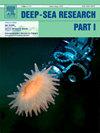Deep-sea ecosystems of the North Atlantic Ocean: discovery, status, function and future challenges
IF 2.1
3区 地球科学
Q2 OCEANOGRAPHY
Deep-Sea Research Part I-Oceanographic Research Papers
Pub Date : 2025-08-28
DOI:10.1016/j.dsr.2025.104580
引用次数: 0
Abstract
The North Atlantic is an ocean basin with a diversity of deep-sea ecosystems. Here we provide a summary of the topography and oceanography of the North Atlantic including the Gulf of Mexico and Caribbean Sea, provide a brief overview of the history of scientific research therein, and review the current status of knowledge of each of 18 pelagic and benthic deep-sea ecosystems, with a particular focus on knowledge gaps. We analyse biodiversity data records across the North Atlantic and highlight spatial data gaps that could provide important foci for future expeditions. We note particular data gaps in EEZs of nations within and bordering the Caribbean Sea. Our data provide a baseline against which progress can be tracked into the future. We review human impacts caused by fishing, shipping, mineral extraction, introduction of substances, and climate change, and provide an overview of international, regional and national measures to protect ecosystems. We recommend that scientific research in the deep sea should focus on increasing knowledge of the distribution and the connectivity of key species and habitats, and increasing our understanding of the processes leading to the delivery of ecosystem services. These three pillars - distribution, connectivity, ecosystem function - will provide the knowledge required to implement conservation and management measures to ensure that any deep-sea development in the future is sustainable. Infrastructure and capacity are unevenly distributed and implementation of strategies that will lead to more equitable deep-sea science is required to ensure that essential science can be delivered.
北大西洋深海生态系统:发现、现状、功能和未来挑战
北大西洋是一个拥有多种深海生态系统的海洋盆地。本文概述了北大西洋(包括墨西哥湾和加勒比海)的地形和海洋学,简要概述了其中的科学研究历史,并回顾了18个远洋和底栖深海生态系统的知识现状,特别关注了知识空白。我们分析了整个北大西洋的生物多样性数据记录,并强调了空间数据差距,这可能为未来的探险提供重要的焦点。我们注意到,在加勒比海内和沿岸国家的专属经济区存在特别的数据缺口。我们的数据提供了一个基线,可以用来跟踪未来的进展。我们回顾了渔业、航运、矿物开采、物质引入和气候变化对人类的影响,并概述了保护生态系统的国际、区域和国家措施。我们建议,深海的科学研究应侧重于增加对关键物种和栖息地的分布和连通性的认识,并增加我们对导致生态系统服务提供的过程的理解。这三大支柱——分布、连通性和生态系统功能——将提供实施保护和管理措施所需的知识,以确保未来任何深海开发都是可持续的。基础设施和能力分布不均,需要实施将导致更公平的深海科学的战略,以确保能够提供基本的科学。
本文章由计算机程序翻译,如有差异,请以英文原文为准。
求助全文
约1分钟内获得全文
求助全文
来源期刊
CiteScore
4.60
自引率
4.20%
发文量
144
审稿时长
18.3 weeks
期刊介绍:
Deep-Sea Research Part I: Oceanographic Research Papers is devoted to the publication of the results of original scientific research, including theoretical work of evident oceanographic applicability; and the solution of instrumental or methodological problems with evidence of successful use. The journal is distinguished by its interdisciplinary nature and its breadth, covering the geological, physical, chemical and biological aspects of the ocean and its boundaries with the sea floor and the atmosphere. In addition to regular "Research Papers" and "Instruments and Methods" papers, briefer communications may be published as "Notes". Supplemental matter, such as extensive data tables or graphs and multimedia content, may be published as electronic appendices.

 求助内容:
求助内容: 应助结果提醒方式:
应助结果提醒方式:


